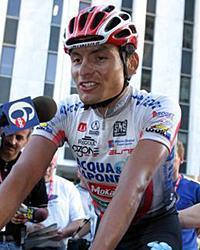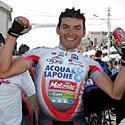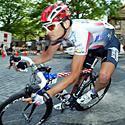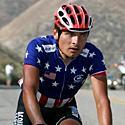
Recently on Cyclingnews.com |
BMC Software New York City Cycling Championship - NE
USA, August 1, 2004
An interview with Fred Rodriguez, August 1, 2004
By Mark Zalewski in New York
Olympic Passover
 |
Fred Rodriguez is having one of his best seasons as a professional. A stage win at the Giro d'Italia and the USPRO Road Championship indicated that he is at the top of his game, and when a certain Tour de France winner decided to skip the Olympics, many, including Rodriguez, assumed he was in - Rodriguez was ready to go for the gold on a course that suited his racing style perfectly.
However, the powers that be had other ideas. With a new procedure in place, USA Cycling announced that Levi Leipheimer would fill the Armstrong vacancy. This left Rodriguez speechless. Cyclingnews' Mark Zalewski sat down with a man down but not out on the eve of the NYC Cycling Championships.
Cyclingnews: What was your reaction upon learning that you were not selected for the starting team?
Fred Rodriguez: I was amazed. I had heard before that Lance was thinking about not doing it, so I still had a big hope, and I knew that I was the most likely candidate for the event. I'm not taking anything away from my friends, because they are all my friends on the team, but they know and I know that the course is most suited to my skills and not their skills. They don't have a choice, so no one is going to give up a spot -- I don't expect them to give up the spot to allow me to race -- but I think out of all the guys that are there, that the only person that also should be there -- not excluding them -- is myself. I feel bad for myself and for the team for that. But the way the rules are set up, here in the U.S., we have to follow a more political standpoint within sports because of the USOC -- while the other European teams use coaches selection more.
"I thought I could be on top of the world that day, and be a big player. I'm not getting that chance anymore, and it's upsetting." |
The only problem is that they never thought there would be so many riders qualifying through that criteria. We have guys like George [Hincapie], Bobby [Julich], Levi [Leipheimer] qualifying on hors category mountain stage races for a flat, one-day race. They never thought that would happen. They made [the criteria] really hard, hoping they would get Lance and a couple of top guys. Then the coaches would have the final selections -- that's my analogy of the whole thing.
 |
CN: So you assumed that with Lance announcing he would not race that you would be selected?
FR: What happened when Lance dropped out is that he dropped out so early in the process of the Olympic selection, that the team had not actually given the USOC the team, so at that point he basically took himself out before the full team was selected. So, if he had waited until about now, and said he was not racing the Olympics, now there would have been five riders on the team and then the coaches would have selected first and second alternate, which would have most likely been myself. As of now, I am first alternate. If someone else gets sick, then there is no doubt I would be the next one in. Lance dropping out so early in the event, they had to think twice and sit down with lawyers and say, 'What do we do here because we haven't actually presented the team to the USOC?' And they are like, 'If you don't want to be sued...' I was told that partly it was going to upset people if they don't go back to the procedure. So they decided to go back to the procedure and that is how Levi got the spot.
CN: Were you ever told that you would be on the team?
FR: At first they sent me an email saying, 'Are you interested in racing the Olympics if we give you a spot?,' and I said yes. They said, 'You are on the high priority of getting a spot.' And I think at that point they hadn't gone back and looked at the whole procedure, and I think they jumped the gun -- they thought they had something they didn't have, so they had to back step. And I called them just asking for information about travel and 'No, you aren't getting the spot.' And I was like, 'Ohhhh, are you kidding?' I thought it was a joke. I didn't believe it at first. Did I do something wrong? Did I upset somebody? I didn't know that someone had qualified automatically. Once they told me the whole procedure then I understood.
CN: You really have good form this year -- I assume you are upset about not being selected?
FR: Yeah, it's sad and it's political. For the 2000 Olympics I was really nervous that I wasn't going to get the spot, and I got it. And this year, I'm flying, I really felt motivated for the Olympics. The course -- after doing my first Olympics, after what I have done this year -- I thought I could be on top of the world that day, and be a big player. I'm not getting that chance anymore, and it's upsetting. They way I deal with it now is try not to think about it too much.
Fast Freddy CoffeeDuring today's press conference, the race organizers slipped in a little plug for what Rodriguez has been working on with his time off here in the States -- a new line of coffee designed for cyclists. As many cyclists know, coffee is a staple of professional racing -- particularly for the Americans looking for anything consistent in the life of inconsistency that is pro racing in Europe. Rodriguez explained what the plans are and why he wanted to get involved in the venture: "One of the blends is going to be called Turbo Blend, so we are looking to develop a theme within cycling. My wife wants a Soft Pedal blend (decaf) for when she wants to relax!" he laughs. "You even hear Lance talk about coffee during the Tour, how much it waked him up in the morning and keeps him going. That's the first thing we do -- we get to a race, our bus gets parked, the bus driver hits 'On' on the expresso machine and starts handing out coffee. It's the first thing I do in the morning. You've been training hard for weeks and got to get up and do it again. My minerals and my recovery drink and my coffee -- if I ever forget my coffee it's like I forgot my vitamin C!" Freddy chuckles, "so it's right up there with those things." |
 |
CN: What did you do after Philadelphia, when you thought there was still a chance you could make the team?
FR: Just hung out with my wife and my dog -- visiting family. It's the first time in my career that I have had two months in the summer to be at home, train at home on my roads. It's a unique opportunity. Usually I come home after the classics in Belgium, have two weeks to relax that go by like it's one day, then have to train for Philadelphia, so I am rushing to get back into form. Next thing I am back over in Europe until the winter. This year, after Philadelphia and after the Olympic Trials, I had a month to relax and rebuild again. I thought I had planned it out perfect -- I have the trials and then I can take two weeks off my bike and then I have two months to get ready for the Olympics. I have the best opportunity to get ready for the Olympics. My team said, 'Do whatever you need to do to get ready for the Olympics.' So it's sad -- I had everything set up to get there in peak form.
CN: Do you think it was wise to have a course that is significantly different and more difficult than the Athens course for the Olympic Trials?
 |
FR: For the fact that I didn't have a team, if it was an easier course it would have been a lot harder for me to control. Technically, it was not a course that mimics at all what the Olympic course was going to be like. But at the same time, it made it a little easier for me because I am a strong rider, so I was able to tough it out. But yeah, if it was easier, it would it more of a risk. Chris Horner and I made a big mistake there because we marked each other a little too much, and we cancelled each other out. He was the strongest guy in the hills, and in return I was the strongest in the sprint.
CN: What are your plans now after New York?
FR: I'm going back to Europe and get ready for the second half of the season. Mentally I'm pretty fresh -- physically I'm really fresh. Go back and do what my team requires of me in the Italian one-day races, get ready for San Francisco, do well in San Francisco, and try to hold that form until World's. Especially after the mess with the Olympics, I am expecting 100 percent support from the national team. I'm already laying the cards down and saying I want to do well there. And it's in Italy.
